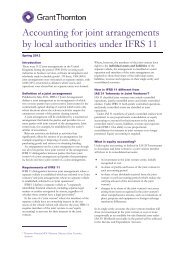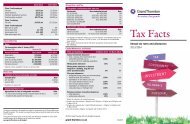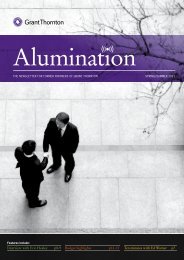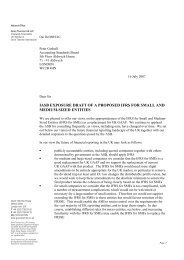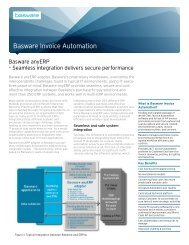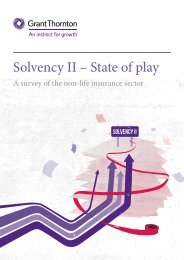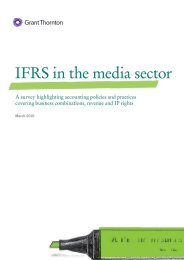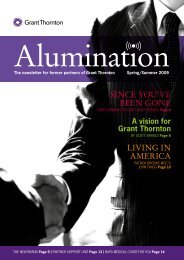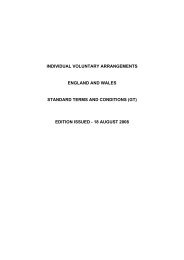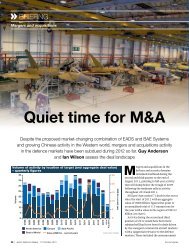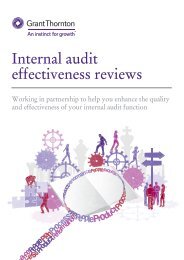Bespoke â Grant Thornton
Bespoke â Grant Thornton
Bespoke â Grant Thornton
Create successful ePaper yourself
Turn your PDF publications into a flip-book with our unique Google optimized e-Paper software.
INVESTMENT<br />
King George Ibecame the governor of the fledgling<br />
South Sea Company in 1718, providing credibility and<br />
aboost to the shares. His mistresses, the countess of<br />
Darlington and Duchess of Kendall, were heavily involved<br />
and suffered harsh criticism when the bubble burst<br />
THE BUBBLE ITSELF<br />
In 1711 agroup of merchants had<br />
formed the South Sea Company and<br />
were granted exclusive trading rights<br />
in Spanish South America. At that<br />
time, when the whole of America was<br />
being explored and settled, the ‘South<br />
Seas’ was what we called South<br />
America and its surrounding waters.<br />
In return for its trading monopoly,<br />
the company guaranteed to<br />
underwrite £9 million of UK<br />
government debt incurred by war,<br />
assured by the government of a6%<br />
interest rate –£540,000 guaranteed<br />
annually. Despite very little real trade<br />
being conducted with the Spanish in<br />
the following years, fanciful talk of<br />
golden opportunities, encouraged by<br />
the merchants in the company, led to<br />
acontinual increase in the value of the<br />
stock. In 1718 King George became<br />
governor of the company, and its<br />
success was assured. Buying into the<br />
South Seas became the fashionable<br />
way to riches.<br />
THE ART OFSPIN<br />
In early 1720 the stock started to<br />
soar. Parliament had accepted the<br />
company’s proposal to take over<br />
the national debt and the company<br />
expected to recoup itself from<br />
expanding trade as well as the increase<br />
in value of shares. On the latter point,<br />
at least their hopes were well founded:<br />
fuelled by continuing extravagant<br />
tales of treasure in Spanish America,<br />
the shares went into overdrive, rising<br />
from £128 in January to more than<br />
£1,000 in August.<br />
KEEPING THE PLATES<br />
IN THE AIR<br />
Fortunes were made overnight and<br />
no investor, itseemed, could afford<br />
to miss out. The company cannily<br />
passed on stock to politicians and<br />
aristocrats to ensure that they would<br />
keep talking up their shares: stock<br />
in the company was ‘sold’ to them at<br />
the going market price. However,<br />
rather than paying for the shares, they<br />
simply held on to what shares they<br />
had been offered, sold them back to<br />
the company when and as they chose,<br />
and received as profit the increase in<br />
market price. Their interest was<br />
bound to the fortunes of the<br />
company: in order to secure their<br />
own profits, they had to help drive<br />
up the stock.<br />
The Prince of<br />
Wales became<br />
the governor<br />
of one company<br />
and is said to<br />
have cleared<br />
£40,000 –the<br />
equivalent of<br />
£61m nowadays<br />
LITTLE BUBBLES<br />
OF ACRAZY NATURE<br />
Agreat froth of speculative projects,<br />
soon dubbed ‘Bubbles’, sprang up in<br />
the wake of the South Sea Company’s<br />
success, some genuine and some<br />
frankly preposterous. These included<br />
heat-resisting paint; trading wool<br />
with Barbary and ‘preserving our<br />
countrymen from being carried into<br />
slavery’; dealing in hair; trading in<br />
woad; importing broomsticks from<br />
Germany; extracting silver from lead;<br />
and that favourite of the truly<br />
hopeful, the perpetual motion<br />
machine –‘capital, one million’. More<br />
than 100 were advertised in June 1720<br />
alone. The Bubble Bill had to be<br />
devised by Parliament, most of whose<br />
members were in the scam up to<br />
their necks, to suppress them before<br />
they diverted too much cash from<br />
the South Sea Company itself. The<br />
Bubble Bill required all new joint<br />
stock companies to have aRoyal<br />
Charter as ameans of preventing<br />
the fraudulent ‘Bubbles’ that were<br />
springing up.<br />
‘TOTAL REVOLUTION<br />
IN THE ART OFWAR’<br />
Among the characters of the<br />
moment was James Puckle, aveteran<br />
‘Projector’ (the name given to<br />
those who spent their time devising<br />
money-making schemes) who<br />
promoted afiendish machine gun<br />
that could fire both round and square<br />
bullets. The latter were to be<br />
employed against the Turks as they<br />
hurt more. He then added apatent<br />
for asword he had invented, writing<br />
to Charles Stanhope, Secretary to<br />
the Treasury, that it was ‘worth<br />
avictory to the army that first has it’.<br />
THE MADDEST ONE OF ALL<br />
The most outrageous scam of all was<br />
an advertisement for abusiness<br />
proposition ‘for carrying out an<br />
undertaking of great advantage, but<br />
nobody to know what it is’.<br />
Enthusiastic crowds are said to have<br />
surrounded the company’s office in<br />
Cornhill, snapping up £100 shares for<br />
deposits of £2 each. By three o’clock<br />
the unknown author of the ploy had<br />
sold 1,000 shares, and he shut up<br />
shop. That same evening he was on<br />
the boat to the Continent, never to<br />
be seen again.<br />
GETTING SATIRICAL<br />
Pamphleteers and the newspapers<br />
mocked the absurdities and came up<br />
with their own, confusing the<br />
situation further. Among those listed<br />
in apamphlet called ‘The Battle of the<br />
www.grant-thornton.co.uk



